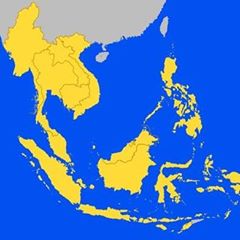Commentary: Indonesia invokes Philippines’ arbitral win in diplomatic bombshell against China
CHNA’S 9- – – LINE

It came in the form of a diplomatic letter lodged with the United Nations on May 26, invoking a landmark 2016 Permanent Court of Arbitration (PCA) ruling in a suit filed by the Philippines against China’s nine-dash line map.
It is one that, without doubt, reverberates loud and clear in the State Banquet Hall of the Great Hall of the People in Beijing, the seat of the Central Committee of the Chinese Communist Party.
China ignored ample warning
On New Year’s Day this year, the Indonesian Ministry of Foreign Ministry had issued a statement against recent Chinese actions in the Natunas.
This first broadside of a press statement—barely audible to many Southeast Asian foreign policy observers—invoked the PCA’s South China Sea arbitration ruling to criticize Chinese encroachments over the Indonesian Exclusive Economic Zone (EEZ) straddling the Natunas.
I had suggested in a January piece for Vera Files that the press statement—”may prove to be a diplomatic and legal game changer in the increasingly volatile South China Sea.”
It was, I had written, “the very first time that a third party Association of Southeast Asian Nation (ASEAN) member- state invoked the landmark 2016 arbitral ruling in the South China Sea case filed by the Philippines three years earlier against Chinese expansionist moves in the region.”
Five months later, the press statement had become a formal diplomatic letter filed with UN Secretary General Antonio Gutteres.


AD SPACE RESERVE FOR YOU
Contact:
Memento Maxima Digital Mktg.
@ [email protected]
.
Talk about consistency
“Indonesia reiterates that the Nine-Dash line map implying historic rights claim clearly lacks international legal basis and is tantamount to upset UNCLOS 1982,” said Indonesia’s Permanent Mission to the United Nations in the letter delivered May 26.
“This view has also been affirmed by the Award of 12 July 2016 by the Tribunal that any historic rights that the People’s Republic of China may have had to the living and non-living resources were superseded by the limits of the maritime zones provided for by UNCLOS 1982.”
UNCLOS refers to the landmark UN Convention on the Law of the Sea, where Indonesia emerged as one of the parties that stood to gain much, with the acceptance by and large by treaty negotiators of its position on archipelagic states and their maritime entitlements.
The Chinese claim over nearly all of the South China Sea is known as the nine-dash line claim, because of nine dotted lines the Chinese government had imposed on a map of the region for the first time in 1947, to establish such claim.
Although the Chinese government had been notoriously obtuse in its explanations of the lines, when traced, they run 2,000 kilometers from the Chinese mainland to within a few hundred kilometers of the Philippines, Malaysia and Vietnam.
Jakarta’s May 26 diplomatic letter to the UN echoes the press statement the Indonesian Ministry of Foreign Affairs on January 1 in the wake of a series of encroachments by Chinese coast guard vessels in the Natuna Sea, which lie nearly 1,100 kilometers south of the Spratlys in the South China Sea. The resource-rich Natuna Sea straddles an archipelago of 271 Indonesian islands.
But both the May 26 diplomatic note and the January 1 press statement closely follow the language of a July 8, 2010 note its permanent mission had sent to the UN in response to a Chinese “circular note” formally submitting the nine-dash line map to the world body in 2009.
This earlier diplomatic letter, addressed to then UN Secretary General Ban Ki-Moon, shot down the claim point-blank, invoking China’s own statements in the past accepting in full the maritime regimes embodied in the UNCLOS.


AD SPACE RESERVE FOR YOU
Contact:
Memento Maxima Digital Mktg.
@ [email protected]
.
Domino effect
But it took the Philippines to clarify the nine-dash line map’s status once and for all when it sued China before the PCA in 2013 over the status of maritime features that the former argued, are part of its EEZ.
The 2016 PCA ruling noted that in the language of the UNCLOS itself, the Chinese understanding and practice of historic rights as to the nine-dash line does not pertain to historic title to land or maritime areas, which would amount to a claim of full sovereignty, but only to “historic rights short of title.”
Moreover, as the UNCLOS superseded any historic rights, or other sovereign rights or jurisdiction, in excess of the limits it imposes, the nine-dash line claim is inconsistent with China’s own treaty obligations as a party to the UNCLOS.
Although the ruling is only binding on the parties, other states may also invoke the international law norms it embodies in similar maritime disputes.
Much earlier, I also wrote about the “domino effect” of the Hague ruling. This means that even if refused acceptance by China, the ruling also benefits neighboring states in the ASEAN with their own territorial disputes with China.
With a judgment embodying definitive rulings on what before were unclear problem areas as far as the features found in the South China Sea is concerned, the PCA’s decisive demolition of the nine-dash line claim has that effect.
Indonesia, like the Philippines, is an archipelago, but much bigger, with 17,508 officially listed islands for a country of nearly 270 million.
The Chinese government claims the Natunas as “relevant waters” that had been visited by Chinese fishermen since time immemorial.
The Chinese reference to relevant waters is a roundabout way of asserting historic claim over waters–but one that had been decisively debunked by the arbitral ruling handed down by the UN-backed tribunal in 2016 in the suit filed by the Philippines against China over maritime features in the South China Sea.
The Indonesian Ministry of Foreign Affairs had said the notion of relevant waters is not found anywhere in the UNCLOS, bluntly rejecting any suggestion of bilateral talks with China to delimit what the latter says are overlapping maritime jurisdictions.
“Based on UNCLOS 1982, Indonesia does not have overlapping claims with the PRC [People’s Republic of China] so that it is not relevant to have any dialogue on maritime boundary delimitation,” the four-paragraph Indonesian statement this January said in part.


AD SPACE RESERVE FOR YOU
Contact:
Memento Maxima Digital Mktg.
@ [email protected]
.
Subtle no longer
I noted that this point in Jakarta’s January 1 press statement may be a subtle signal to Beijing that any further unwelcome acts in the Natunas may force Indonesia’s hand to steer for a direction Beijing would not want to take itself; that is, yet another arbitration case where it will have little control of the outcome.
The press statement made it clear Indonesia brooks no such claims of maritime overlap.
Recognition by Jakarta of any such overlap with Chinese claims would have foreclosed any resort to the landmark treaty’s compulsory dispute mechanisms successfully used by the Philippines to bring China to arbitration, over the latter’s fierce objections.
Of course, the May 26 UN note is still primarily a diplomatic maneuver more than a legal one, but its legal implications are unmistakable.
China had vociferously attacked the arbitral ruling upholding the Philippine case as a mere scrap of paper.
But this second broadside from Indonesia–which happens to be the world’s largest Muslim country–uses a louder and bigger gun to fire a diplomatic shot across China’s bow.
For the world at large, its unmistakable message is that under international rules, it is the already demolished Chinese claim that is that scrap of paper.


AD SPACE RESERVE FOR YOU
Contact:
Memento Maxima Digital Mktg.
@ [email protected]
.
Romel Regalado Bagares, an alumnus of the University College of Law and the Vrije Universiteit Amsterdam, teaches public international law at the Lyceum Philippines University College of Law, and is treasurer of the Philippine Society of International Law.
VERA Files is put out by veteran journalists taking a deeper look at current issues. Vera is Latin for “true.”










